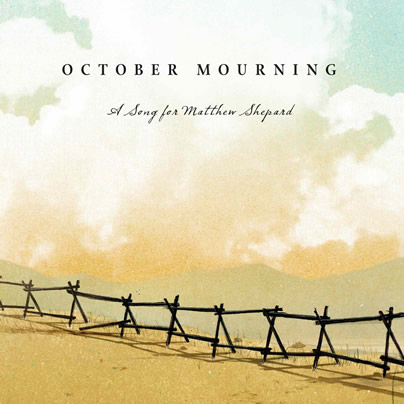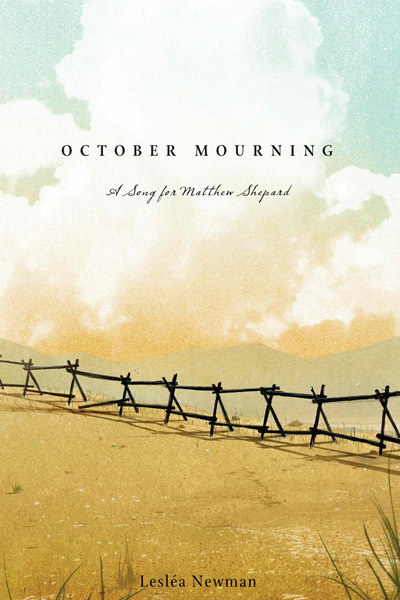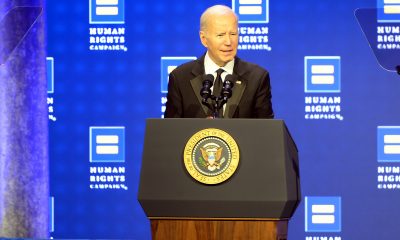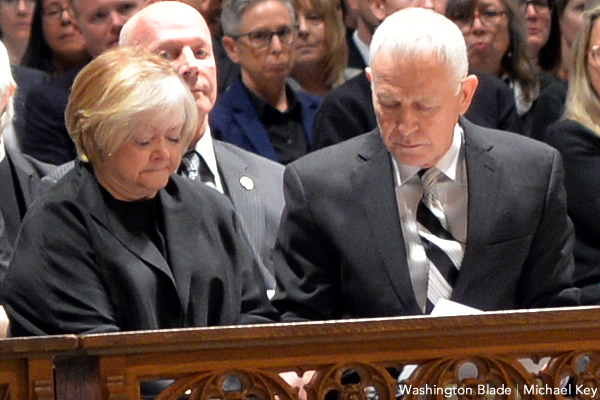Arts & Entertainment
Poetic tribute to Shepard
Clever depiction of tragedy gives voice to inanimate objects in powerful way

‘October Mourning: A Song for Matthew Shepard’
By Lesléa Newman
Candlewick Press
$15.99
128 pages
When you wake up in the morning, there are certain things you expect to be the same.
You’ll have a brand-new day, of course, but it’ll start where you ended last night. Your alarm will be the same, set at a time you probably know all too well. A surprise might await you at some point in each new day, but the familiar is your comfortable beginning.
And yet, while you slept, the world changed.
In the new book “October Mourning” by Lesléa Newman, you’ll see what happened on one frosty night, 14 years ago.
He was outnumbered.
It was two against one: two local boys, placed in a bar with a pitcher of beer. One petite Matthew Shepard, sitting at the same bar, alone.
The boys’ truck knew that the situation wouldn’t turn out well when the two locals lured Shepard into its cab with promises. The road on the way out to the Wyoming vastness thought it had seen everything but when it noticed Shepard trapped in the truck, it wanted to heave.
The clothesline that was used to tie Shepard felt tangled. The fence held him up all night, though he was “heavy as a broken heart.” The fence held on, through wind and prairie alone. It cradled him, as his mother would.
There are many things you can do in 18 hours.
You can cram for a test. You can drive cross-country, read a thick book, watch day turn into night and back again. Or you can wait to be discovered, tied to a fence, with wind and deer as companions.
After Shepard was found, the patrolman thought he’d been crying. The doctor cried when he saw what was left of the boy. The candle at Shepard’s vigil grieved and armbands stood as one. The fence that held him didn’t mind becoming a shrine.
In the days to follow, as news of Shepard’s death raced around the world, it changed some lives: a drag queen went further into the closet. A police commander removed gay slurs from his vocabulary. The bartender who served the local boys felt regrets. Countless students realized that Shepard’s story could have been their own.
Other drivers on the road must think I’m crazy.
There I was, cruising down the highway with tears coating my cheeks, my hand to my mouth. That doesn’t happen often; in fact, few audiobooks move me as much as did “October Mourning.”
Through a series of freestyle verses, author and poet Lesléa Newman imagines in this book the many points of view from people and objects that were witness to Matthew Shepard’s last moments. Newman’s sparse words, performed by several different actors in varied voices and timbres, bring incredible emotion to her scenarios, making this a book with beauty on one side, horror on the other.
Though grown-ups can certainly enjoy this audiobook, I think its best audience is young adults who are too young to remember that one night and its aftermath. For them, “October Mourning” may wake them up.

Team DC, the umbrella organization for LGBTQ-friendly sports teams and leagues in the D.C. area, held its annual Night of Champions Awards Gala on Saturday, April 20 at the Hilton National Mall. The organization gave out scholarships to area LGBTQ student athletes as well as awards to the Different Drummers, Kelly Laczko of Duplex Diner, Stacy Smith of the Edmund Burke School, Bryan Frank of Triout, JC Adams of DCG Basketball and the DC Gay Flag Football League.
(Washington Blade photos by Michael Key)




















The 2024 National Cannabis Festival was held at the Fields at RFK Stadium on April 19-20.
(Washington Blade photos by Michael Key)
















Covering the @NatlCannaFest at RFK Stadium for @WashBlade . Stop by the LGBTQ+ booth and pick up a paper if you are here. pic.twitter.com/is7hnsaPns
— Michael Patrick Key (@MichaelKeyWB) April 20, 2024
Theater
‘Amm(i)gone’ explores family, queerness, and faith
A ‘fully autobiographical’ work from out artist Adil Mansoor

‘Amm(i)gone’
Thorough May 12
Woolly Mammoth Theatre
641 D St., N.W.
$60-$70
Woollymammoth.net
“Fully and utterly autobiographical.” That’s how Adil Mansoor describes “Amm(i)gone,” his one-man work currently playing at Woolly Mammoth Theatre.
Both created and performed by out artist Mansoor, it’s his story about inviting his Pakistani mother to translate Sophocles’s Greek tragedy “Antigone” into Urdu. Throughout the journey, there’s an exploration of family, queerness, and faith,as well as references to teachings from the Quran, and audio conversations with his Muslim mother.
Mansoor, 38, grew up in the suburbs of Chicago and is now based in Pittsburgh where he’s a busy theater maker. He’s also the founding member of Pittsburgh’s Hatch Arts Collective and the former artistic director of Dreams of Hope, an LGBTQ youth arts organization.
WASHINGTON BLADE: What spurred you to create “Amm(i)gone”?
ADIL MANSOOR: I was reading a translation of “Antigone” a few years back and found myself emotionally overwhelmed. A Theban princess buries her brother knowing it will cost her, her own life. It’s about a person for whom all aspirations are in the afterlife. And what does that do to the living when all of your hopes and dreams have to be reserved for the afterlife?
I found grant funding to pay my mom to do the translation. I wanted to engage in learning. I wanted to share theater but especially this ancient tragedy. My mother appreciated the characters were struggling between loving one another and their beliefs.
BLADE: Are you more director than actor?
MANSOOR: I’m primarily a director with an MFA in directing from Carnegie Mellon. I wrote, directed, and performed in this show, and had been working on it for four years. I’ve done different versions including Zoom. Woolly’s is a new production with the same team who’ve been involved since the beginning.
I love solo performance. I’ve produced and now teach solo performance and believe in its power. And I definitely lean toward “performance” and I haven’t “acted” since I was in college. I feel good on stage. I was a tour guide and do a lot of public speaking. I enjoy the attention.
BLADE: Describe your mom.
MANSOOR: My mom is a wonderfully devout Muslim, single mother, social worker who discovered my queerness on Google. And she prays for me.
She and I are similar, the way we look at things, the way we laugh. But different too. And those are among the questions I ask in this show. Our relationship is both beautiful and complicated.
BLADE: So, you weren’t exactly hiding your sexuality?
MANSOOR: In my mid-20s, I took time to talk with friends about our being queer with relation to our careers. My sexuality is essential to the work. As the artistic director at Dreams of Hope, part of the work was to model what it means to be public. If I’m in a room with queer and trans teenagers, part of what I’m doing is modeling queer adulthood. The way they see me in the world is part of what I’m putting out there. And I want that to be expansive and full.
So much of my work involves fundraising and being a face in schools. Being out is about making safe space for queer young folks.
BLADE: Have you encountered much Islamophobia?
MANSOOR: When 9/11 happened, I was a sophomore in high school, so yes. I faced a lot then and now. I’ve been egged on the street in the last four months. I see it in the classroom. It shows up in all sorts of ways.
BLADE: What prompted you to lead your creative life in Pittsburgh?
MANSOOR: I’ve been here for 14 years. I breathe with ease in Pittsburgh. The hills and the valleys and the rust of the city do something to me. It’s beautiful, it’ affordable, and there is support for local artists. There’s a lot of opportunity.
Still, the plan was to move to New York in September of 2020 but that was cancelled. Then the pandemic showed me that I could live in Pittsburgh and still have a nationally viable career.
BLADE: What are you trying to achieve with “Amm(i)gone”?
MANSOOR: What I’m sharing in the show is so very specific but I hear people from other backgrounds say I totally see my mom in that. My partner is Catholic and we share so much in relation to this.
I hope the work is embracing the fullness of queerness and how means so many things. And I hope the show makes audiences want to call their parents or squeeze their partners.




















